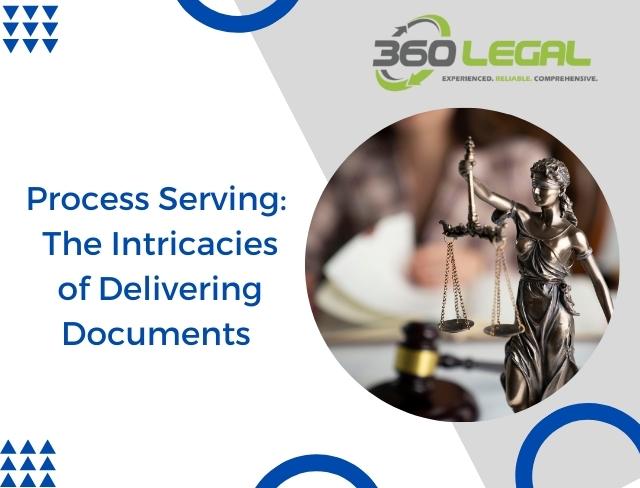The Function of Expert Process Serving in Effective Legal Instance Monitoring
The Function of Expert Process Serving in Effective Legal Instance Monitoring
Blog Article
Understanding the Relevance of Process Serving in Legal Treatments
Process serving is a fundamental facet of lawful procedures that makes certain all parties are informed of their legal rights and responsibilities. By facilitating the formal distribution of crucial legal records, it supports the concepts of due process and adds to the stability of the judicial system. The subtleties of efficient procedure serving expand beyond plain distribution; they include lawful requirements and potential repercussions of inappropriate solution. Recognizing these complexities can dramatically affect the end results of lawful disputes, triggering a better assessment of the practices that underpin this critical feature.
Definition of Process Offering
Refine offering is a crucial component of the legal system, defined as the official delivery of legal papers to people entailed in a court situation. This procedure guarantees that all celebrations are sufficiently educated of lawsuits being taken versus them or to which they are a party. Usually, these documents include summons, grievances, subpoenas, and various other court-related documents that require the recipient's attention and action.
The importance of procedure offering lies in its duty in supporting the principles of due process. It assures that people have notice of legal proceedings, thereby supplying them a chance to respond or safeguard themselves. Proper service of procedure is not just a procedural rule; it is a basic facet of making sure fairness and openness in the judicial system.
Refine serving can be performed by different individuals, including professional process web servers, legislation enforcement policemans, or even attorneys, depending upon administrative guidelines. Each technique of solution has its own standards and practices, which are crucial to stop delays or dismissals within the lawful framework. Recognizing the meaning and feature of process serving is essential for all stakeholders entailed in lawful procedures.

Legal Demands for Refine Serving
Lawful demands for process serving are important to make certain that the delivery of legal documents follows established methods and is identified by the court. Each jurisdiction has details legislations governing exactly how and when files need to be offered, which might consist of subpoenas, grievances, and summonses.
Normally, process web servers have to be unbiased third celebrations that are not involved in the case. They need to also abide by state guidelines concerning service approaches, which can consist of personal solution, substitute solution, or service by mail. Individual service includes delivering records straight to the recipient, while alternative service permits for distribution to one more liable individual at the recipient's home or workplace.
In addition, process-server are normally required to submit an evidence of solution, a legal paper that validates the delivery of documents, with the court. This document includes details such as the date, time, and approach of service, in addition to the name of the person offered.

Duty in the Justice System
A crucial part of the justice system, process serving guarantees that individuals entailed in lawful process are correctly alerted of actions taken against them (Process Serving). This formal notice is vital for maintaining the concepts of due procedure, which mandates that celebrations have the chance to reply to cases made against them. Without efficient process serving, the legal system would certainly be rendered inadequate, as individuals might take part in actions without awareness of pending lawful issues
Process-server offer a crucial duty in safeguarding the integrity of the legal procedure. They work as neutral celebrations, delivering lawful documents such as summons, problems, and subpoenas, hence cultivating openness and responsibility within the judicial structure. By guaranteeing that all celebrations are educated, procedure offering assists to avoid any kind of prospective unjust advantage, permitting equitable involvement in legal proceedings.
Additionally, the professionalism and reliability of process-server adds to the public's count on the justice system. Their adherence to legal requirements and moral techniques strengthens the legitimacy of the judicial procedure. Eventually, reliable process serving is vital in advertising the regulation of law and guaranteeing that justice comes to all people entailed in lawful disputes.
Effects of Improper Service
The consequences of inappropriate service can substantially undermine the honesty of legal procedures. When a party is not served appropriately, it can lead to a host of difficulties, including hold-ups in case timeline and raised lawful costs. Improper solution can result in the defendant not knowing the lawful action versus them, which may prevent them from responding suitably or offering their defense. This absence of notice can eventually cause skip judgments, where the court regulations in support of the plaintiff without hearing the accused's side.
Furthermore, improper solution can make court orders and judgments void, forcing the plaintiff to reboot the procedure, which can be both financially difficult and taxing. It can also unlock to challenges and allures, as the offender might say that they were not effectively informed of the process, making complex the legal landscape further.
Ideal Practices for Effective Service

2nd, timing plays a crucial function. Serving papers quickly can stop hold-ups in legal proceedings and make sure that all events are click now informed in a timely way. Furthermore, employing a specialist process-server can enhance efficiency, as they are trained to guarantee and browse possible challenges compliance with neighborhood legislations.
Third, keeping exact documents of the solution procedure is crucial. Recording the day, time, and way of service can give vital evidence description if disputes develop regarding whether service was properly carried out.
Verdict
To conclude, process serving is an essential element of lawful procedures, ensuring that all parties are duly informed and paid for the opportunity to react. Sticking to lawful needs and ideal methods not just supports the principles of due procedure but additionally strengthens the honesty of the justice system. The effects of incorrect service can result in significant hold-ups and complications, highlighting the requirement for effective process offering in advertising justness and accessibility in legal disagreements.
The nuances of efficient procedure serving prolong beyond simple distribution; they encompass lawful demands and potential repercussions of improper service.Process serving is an important part of the lawful system, specified as the official shipment of legal files to individuals entailed in a court instance. Without effective process serving, the lawful system would certainly be made inefficient, as individuals could engage useful content in activities without understanding of pending lawful issues.
Refine web servers offer an important role in protecting the stability of the lawful procedure - Process Serving. The consequences of improper solution can lead to significant hold-ups and complications, highlighting the necessity for effective procedure serving in promoting justness and accessibility in legal disagreements
Report this page